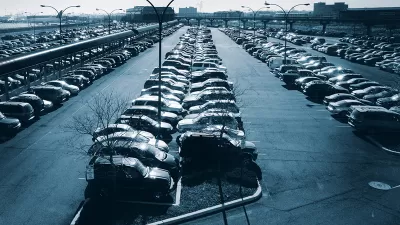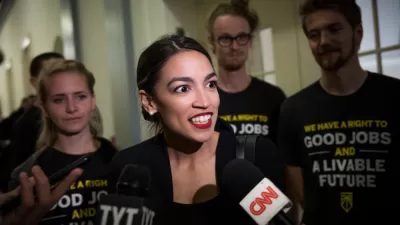President Xi Jinping announced a landmark commitment on Sept. 25 to commence a cap-and-trade program in 2017, going further than the U.S. to limit emissions.
"The announcement, to come during a White House summit meeting with President Obama, is part of an ambitious effort by China and the United States to use their leverage internationally to tackle climate change and to pressure other nations to do the same," write
Republican opponents of President Barack Obama's climate change initiatives have cited China's inaction on global warming, particularly since China is now the world leader in total carbon emissions, though the United States is larger in per capita emissions as the Union of Concerned Scientists chart shows.
Sen. Mitch McConnell (R-Ky.), majority leader of the Senate, had been quick to condemn President Obama's November climate agreement with President Xi Jinping: "...as I read the agreement (it) requires the Chinese to do nothing at all for 16 years, while these carbon emissions regulations are creating havoc in my state and other states around the country," he said.
President Xi Jinping's landmark announcement builds on that historic agreement.
While the cap-and-trade program may start in two years, "it is not clear whether China will be able to enact and enforce a program that substantially limits emissions," note Davis and Davenport. "But the agreement, which American officials said had been in the works since April, is China’s first commitment to a specific plan to carry out what have so far been general ambitions."
Under a cap-and-trade system, a concept created by American economists, governments place a cap on the amount of carbon pollution that may be emitted annually. Companies can then buy and sell permits to pollute. Western economists have long backed the idea as a market-driven way to push industry to cleaner forms of energy, by making polluting energy more expensive.
The United States came close to adopting such a system when the House passed the American Clean Energy and Security Act (Waxman-Markey bill) in June, 2009, which died "when Senate Majority Leader Harry Reid decided not to include a carbon cap or renewable energy standard on the stripped-down bill," according to Time.
Robinson Meyer, associate editor at The Atlantic, explains why China's "new national carbon-market program is such a huge deal."
FULL STORY: China to Announce Cap-and-Trade Program to Limit Emissions

Alabama: Trump Terminates Settlements for Black Communities Harmed By Raw Sewage
Trump deemed the landmark civil rights agreement “illegal DEI and environmental justice policy.”

Study: Maui’s Plan to Convert Vacation Rentals to Long-Term Housing Could Cause Nearly $1 Billion Economic Loss
The plan would reduce visitor accommodation by 25% resulting in 1,900 jobs lost.

Planetizen Federal Action Tracker
A weekly monitor of how Trump’s orders and actions are impacting planners and planning in America.

Restoring Northern India’s Himalayan ‘Water Temples’
Thousands of centuries-old buildings protect the region’s natural springs and serve as community wells and gathering places.

Milwaukee to Double Bike Share Stations
Bublr Bikes, one of the nation’s most successful, will add 500 new e-bikes to its system.

DC Extends Application Window for Outdoor Dining Permits
District restaurants will have until the end of November to apply, but businesses with permits in rush hour parking lanes must end operations on July 31.
Urban Design for Planners 1: Software Tools
This six-course series explores essential urban design concepts using open source software and equips planners with the tools they need to participate fully in the urban design process.
Planning for Universal Design
Learn the tools for implementing Universal Design in planning regulations.
Caltrans
Smith Gee Studio
Institute for Housing and Urban Development Studies (IHS)
City of Grandview
Harvard GSD Executive Education
Toledo-Lucas County Plan Commissions
Salt Lake City
NYU Wagner Graduate School of Public Service




























